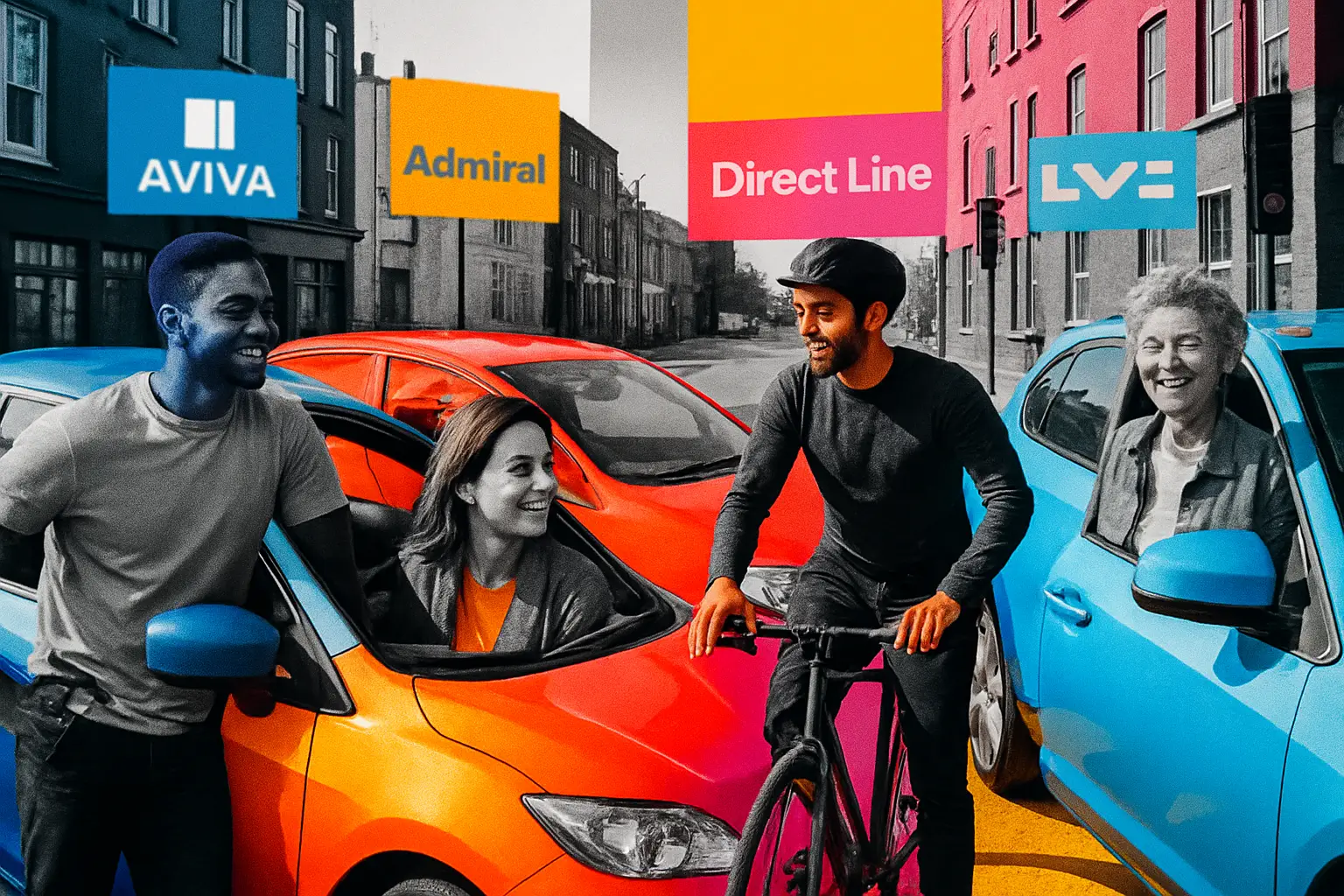A credible, UK-focused guide to fully comprehensive car insurance, comparing leading providers on price, coverage, and claims to help British drivers choose with confidence.
Find the UK insurers leading on value and claims
Comprehensive can be cheaper than third-party in the UK. Understanding why helps you buy smarter, not just cheaper.
Why comprehensive often costs less than you think
Comprehensive cover protects you and your car, not just third parties. In the UK, many insurers price comprehensive policies competitively because drivers who choose them are often lower risk. Recent pricing data shows average comprehensive quotes around £636, frequently undercutting third-party fire and theft and third-party only. That means better protection can align with better value if you compare well and claim sensibly.
Is this guide for you?
This guide is for UK drivers who want fully comprehensive protection with reliable claims support. It will suit motorists renewing in 2025, first-time policyholders, EV and hybrid owners, older drivers seeking tailored benefits, and anyone weighing price against service quality. If you value stable brands, independent ratings, and evidence-led comparisons, you are in the right place.
Cut through the jargon
- Fully comprehensive: The broadest standard cover, typically including damage to your car, third-party liability, fire, theft, vandalism, and often windscreen cover and courtesy car options.
- Excess: The amount you pay towards a claim. Voluntary excess can lower premiums but raises out-of-pocket costs when you claim.
- No Claims Discount (NCD): A premium reduction for claim-free years. Protecting it can cushion future increases, especially after small claims.
- Telematics: Black box or app-based driving data used to price premiums. Can benefit safe or low-mileage drivers.
- Courtesy car: A replacement vehicle during repairs, usually subject to eligibility and approved repairer use.
- Market value: Payout basis reflecting your car’s value at the time of loss, not the original purchase price.
- Add-ons: Extras such as breakdown, legal expenses, key cover, and enhanced personal accident. Assess need and overlap to avoid duplication.
What matters most: Coverage breadth, claims service quality, and total cost after excesses and add-ons. The real value of a policy is most visible when you claim.
The providers to shortlist in 2025
The UK market is large and competitive, with the top 10 insurers writing the majority of premiums. Here are standout comprehensive options based on market share, independent reviews, and expert comparisons.
Snapshot comparison of leading insurers
| Provider | Key strengths | Market signal | Best for |
|---|---|---|---|
| Admiral Group | Scale, multi-brand choice, broad cover options | Largest UK motor insurer with c.15.23% share | Wide range of drivers seeking value and features |
| Aviva | Modern cover, strong support, EV and hybrid focus via Signature | Recommended provider recognition in 2025 | Drivers wanting modern benefits and solid claims support |
| AXA | Competitive pricing, versatile add-ons, strong service benchmarks | Highlighted by expert broker comparisons | Cost-conscious drivers who still want robust cover |
| LV= (Allianz-owned) | Customer service, comprehensive options, rising market share | Climbed to fourth place with c.10%+ share | Drivers prioritising service with big-brand backing |
| Allianz | Service reputation and steady claims handling | High consumer satisfaction across UK insurance lines | Those who value claims reliability |
| Saga | Tailored for over-50s, 5-star product ratings | Highly rated for older drivers | Experienced drivers wanting age-specific benefits |
| NFU Mutual | High satisfaction, fair-fee approach on monthly payments | Strong consumer approval | Drivers valuing service and transparent charging |
| Swinton | Clear levels of cover, customisable extras | Broad broker-access proposition | Shoppers who want help choosing levels |
| Carole Nash | Niche cover options, accessories protection | Focus on specific driver needs | Drivers with specialist equipment or add-on needs |
The best policy is the one that pays fairly and quickly when you need it.
Price, protection, and the real cost
- Typical pricing: Recent UK data indicates average comprehensive quotes around £636. Third-party fire and theft and third-party only often cost more, reflecting risk selection and claims patterns.
- Impact on your wallet: Excess size, protected NCD, and optional extras can shift the real cost of ownership. Cheap premiums with high excess and limited courtesy car may cost more after an accident.
- Claims matters: Independent reviews consistently reward insurers with smooth claims handling. Service quality at claim time is where value becomes visible.
- Risks to weigh: Underinsurance through low add-on uptake, non-disclosure of modifications, and gaps such as uninsured loss recovery or inadequate courtesy car terms.
Rule of thumb: Compare total annual cost plus likely claim-time expenses. Avoid over-buying duplicate extras you already hold through bank accounts or breakdown memberships.
Who typically qualifies
- Residency: UK residents with a full or provisional UK driving licence.
- Vehicle: Most private cars, including EVs and hybrids. Modified or high-performance vehicles may require specialist cover.
- Driving history: A clean record helps, but many providers accept points or previous claims at higher premiums.
- Usage: Social, commuting, and business class 1 can be accommodated. High-mileage or business use may require tailored terms.
- Security: Garaging, approved alarms, trackers, and safe postcode profiles can reduce costs.
Insurers price risk. Accurate information on mileage, occupation, and prior claims is essential. Misstatements can void cover or delay claims.
From quote to cover in clear steps
- Define your must-haves and nice-to-haves
- Gather details - licence, NCD proof, mileage, claims
- Get at least three quotes from leading providers
- Compare claims features - repair networks, courtesy car
- Check excess levels and add-on overlaps
- Review consumer ratings for service consistency
- Confirm EV or specialist needs if relevant
- Buy, set up payments, and store documents securely
Weighing the upsides and trade-offs
Fully comprehensive insurance offers the broadest protection and, in many UK cases, competitive pricing compared with third-party options. You are more likely to receive a courtesy car and benefit from approved repair networks and guaranteed repairs. The trade-off is the potential for higher excesses and the temptation to add extras that raise costs without adding value. Drivers with claims or convictions may see steeper premiums, but telematics and careful insurer selection can offset this.
Avoid surprises before you click buy
- Excess clarity: Know both compulsory and voluntary excesses for glass, theft, and young drivers.
- Courtesy car terms: Check vehicle type and availability during non-fault and fault repairs.
- EV specifics: Battery, cables, and home charger cover can vary materially.
- Monthly payments: Interest and admin fees differ. Some providers are more transparent.
- Modifications: Declare factory options and aftermarket changes to avoid claim disputes.
- Claims support: Look for 24-hour lines, UK-based teams, and strong independent satisfaction scores.
If not this, then what?
- Telematics policies: Useful for young or low-mileage drivers seeking lower premiums through data-driven discounts.
- Brokers and specialists: Swinton and Carole Nash help tailor cover for unique needs, from audio equipment to sat nav protection.
- Mutual and niche providers: NFU Mutual and Saga offer strong service and demographic focus, particularly for rural or older drivers.
- Policy mix: Consider adding breakdown or legal cover only where gaps exist to avoid duplication.
Frequently asked questions
- Is comprehensive always more expensive than third-party? Often no. UK data shows average comprehensive quotes can be lower than third-party policies due to risk selection.
- Which insurers lead the market right now? Admiral holds the largest share. Aviva, AXA, LV=, Allianz, Saga, and NFU Mutual also stand out for cover and service.
- How important are consumer ratings? Very. Which? and other review sources highlight claims handling and satisfaction, which matter more than headline price.
- Should I pay monthly or annually? Paying annually usually costs less. If paying monthly, compare interest and any admin fees.
- What about EVs and hybrids? Look for policies like Aviva’s Signature that include EV-specific benefits such as battery and charger cover.
- Do older drivers have better options? Saga focuses on drivers over 50 with strong coverage and service recognition.
- Can a broker help me save? Yes. Brokers compare multiple insurers and can align add-ons and excess to your profile.
What to do next
- Shortlist three providers from the table above based on service and features.
- Gather documents - NCD proof, licence details, mileage, and claims history.
- Get quotes directly and via a broker to compare both price and claims features.
- Review EV or specialist needs if applicable, and only add extras that fill genuine gaps.
Small differences in claims terms can outweigh a small premium saving.
Important information
This guide is for general information only and does not constitute financial advice. Policy features, eligibility, and prices vary by insurer and your circumstances. Always read the policy documents and insurer assumptions before purchasing.
Get smarter with your money
Join thousands of people in the UK who are taking control of their financial future

FAQs
Common questions about managing your personal finances
Begin by tracking every expense for one month. Use an app or spreadsheet. No judgment. Just observe your spending patterns.
Cancel unused subscriptions. Cook at home. Compare utility providers. Small changes add up quickly.
Aim for 20% of your income. Start smaller if needed. Consistency matters more than the amount.
Choose reputable apps with strong security. Read reviews. Check privacy policies. Protect your financial data.
Pay bills on time. Keep credit card balances low. Check your credit report annually. Be patient.
Still have questions?
Our team is ready to help you navigate your financial journey
More financial insights
Explore our latest articles on personal finance and money management




